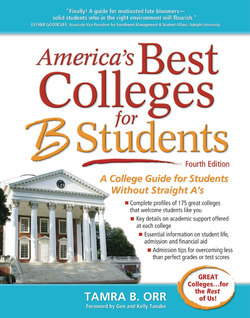Читать книгу America's Best Colleges for B Students - Tamra B. Orr - Страница 41
На сайте Литреса книга снята с продажи.
A WORD ABOUT TEST ANXIETY
ОглавлениеFeeling worried or pressured about taking a test is normal. Indeed, a slight edginess can often enhance your performance. However, if the worry turns into panic and/or fear and makes it almost impossible to study or take the test, you probably are suffering from test anxiety.
Test anxiety can strike before and/or during a test. It can make you feel physically sick, from a headache or nausea to faintness and hyperventilating. You might have a dry mouth, pounding heart or sweaty hands or be unusually emotional. It is often very difficult to concentrate at all.
How can you combat it? Here are some tips:
1 Be prepared as much as possible for the test. The SAT and ACT are cumulative exams that assess years of study in high school. They are not tests for which you can “cram.” Get a good study guide and become familiar with what the SAT and ACT test. Try a few of the practice tests. Then relax and just do your best.
2 Take good care of yourself. Get enough sleep, eat healthy and get some regular exercise. Don’t have any coffee before the test because caffeine increases your level of anxiety.
3 Learn how to relax. Sounds simple, but it can be challenging when your body and mind are trying to do just the opposite. Like with other things, practice is the key. Spend time learning how to think about each muscle group in your body. Start with your feet. Tighten them and then let them go. Work your way all the way up to your head. Breathe slowly and deeply.
4 Replace negative thoughts with positive ones. Instead of telling yourself, “I am just going to blow this entire test,” say, “This may be a difficult test but I will do the best I can on it.” Visualize yourself doing well on the test.
5 When you are taking the test, remember those deep, slow breaths. Be sure to read the test directions carefully. If you don’t know a question, skip it and go back later.
6 If you find yourself tensing up during the test, put down your pencil, take a few deep breaths, relax your neck and shoulders and then go back to it. Go to another question or problem and come back to the one that made you anxious. Sometimes answering a few problems that you do know will help you remember the answer to the one that threw you a curve.
7 When you are done, do something fun. See a movie, go out to eat, meet with a friend or just take a well-deserved nap.
| 123 4th St. Anytown, USA 10000 | Phone 555-555-5555Fax 555-555-5556Email anystudent@aol.com |
| CHRIS SMITH | |
| Community Involvement | Volunteered for six months (2011) at The Boys and Girls Club: helped organize and guide 30 children between the ages of 8 and 13 in multiple after-school activities. Learned skills of organization, teamwork, cooperation and discipline. Intern at Wheels Unlimited, my grandfather’s bicycle repair shop, after school for two years (2009-2011). Learned how to serve customers, run a register and basic mechanics/engineering skills. |
| Extracurricular Activities | Participated in the Chess Club (2009) and the Debate Club (2010-2011). Director of the Drama Club (2010) and President of the Ski Club (2011). |
| Employment | June-August 2010 20 hours a week at Marin County Public Library June-August 2011 18 hours a week at the Community Theatre |
| Education | 2008-2011 East County High School Summer 2010 Theatre Workshop Summer 2010 Sign Language 101 at St. Martin’s Community College |
| References | Mr. Bob Smith, Youth Coordinator at the Boys and Girls Club, 555-222-1111 Mrs. Jean Youngblood, English/Language Arts Teacher, East County High School, 555-982-1120 Mr. Rod Cooper, High School Debate Coach, 555-888-1210 Miss Lindsay Francis, Professor of Sign Language, St. Martin’s Community College, 555-333-0101 |
| Awards received | Debate Team Regional First Prize, 2010 First Place, State Library Essay Contest, 2010 Heart of Gold, Volunteer Ribbon, 2011 |
